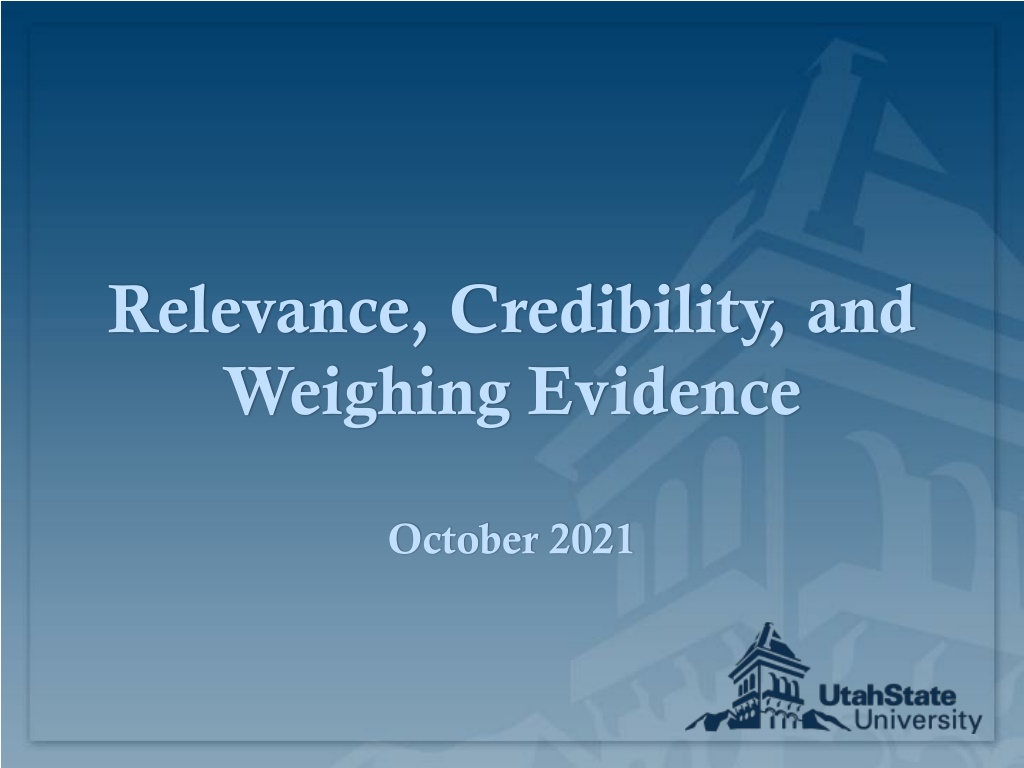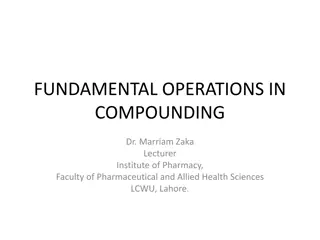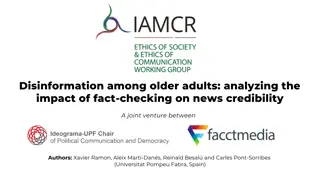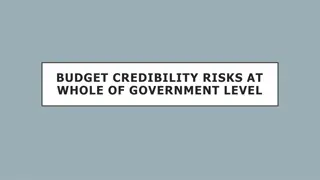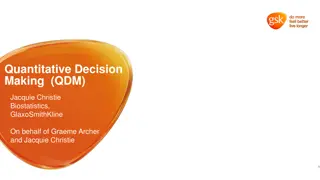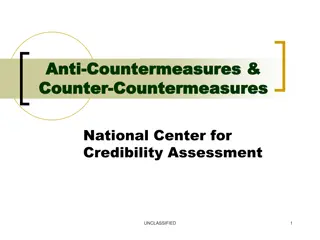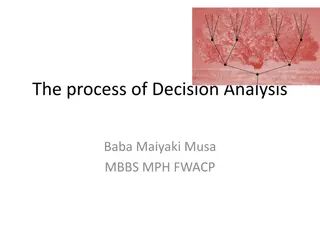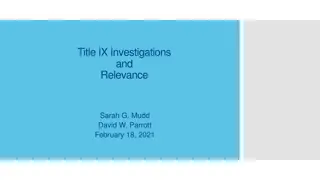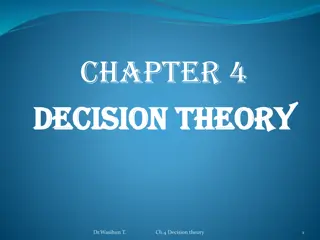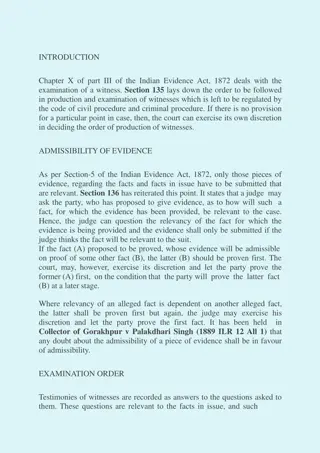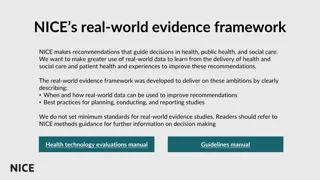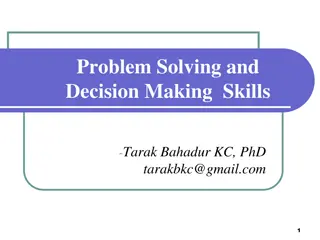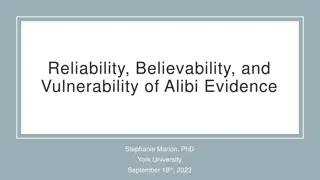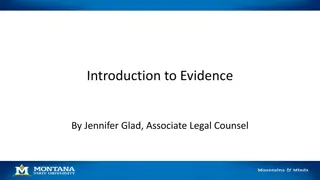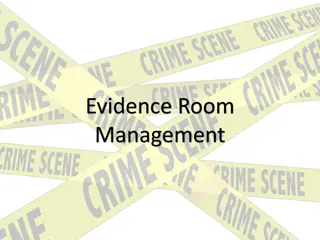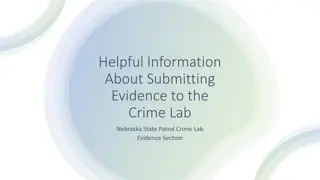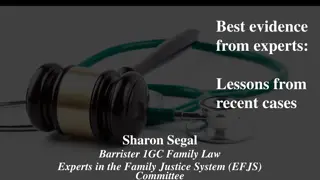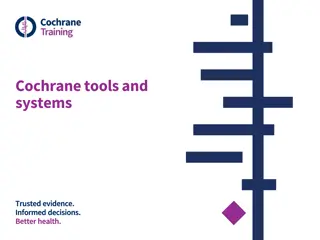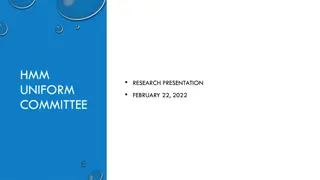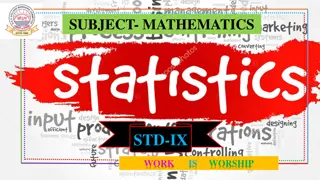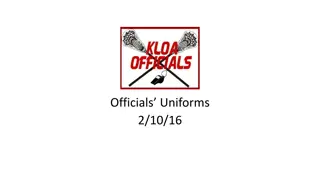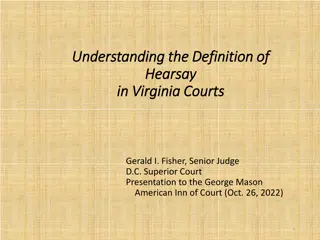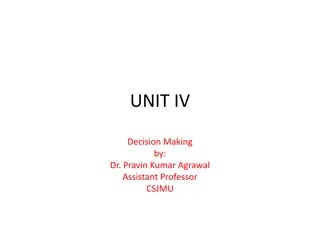Understanding Relevance, Credibility, and Weighing Evidence in Decision-Making
Explore the importance of relevance and credibility in evidence assessment, the role of hearing panels in evaluating evidence fairly, and the responsibilities they hold. Learn about presenting relevant evidence, policy analysis, and identifying irrelevant evidence to ensure a thorough review process.
Uploaded on Aug 14, 2024 | 2 Views
Download Presentation

Please find below an Image/Link to download the presentation.
The content on the website is provided AS IS for your information and personal use only. It may not be sold, licensed, or shared on other websites without obtaining consent from the author. Download presentation by click this link. If you encounter any issues during the download, it is possible that the publisher has removed the file from their server.
E N D
Presentation Transcript
Relevance, Credibility, and Weighing Evidence October 2021
Role of the Hearing Panel Provide a fair and unbiased review of the evidence focusing on what is relevant, credible, etc. Follow the policy and procedures Make a determination of whether there is preponderance of evidence that Respondent violated the policy. Write the Determination
What is Relevant? Evidence is relevant if it tends to make the allegations at issue more or less likely to be true. Relevant evidence can include both exculpatory and inculpatory evidence.
Presentation of Relevant Evidence [T]hroughout the grievance process, a recipient must not restrict the ability of either party . . . to gather and present relevant evidence. 106.45(b)(5)(iii). The recipient must make all evidence [directly related to the allegations] subject to the parties inspection and review available at any hearing to give each party equal opportunity to refer to such evidence during the hearing, including for purposes of cross-examination. 106.45(b)(5)(vi)
Hearing Panel Responsibilities The Hearing Panel is responsible for the following: Asking relevant questions of the parties and witnesses at the hearing Determining whether questions asked by the process advisors, on behalf of the party, are relevant, and therefore allowed to be asked at the hearing. Outlining relevant evidence in the Written Determination.
Policy Analysis Break down the policy into elements Organize the facts by the element to which they relate Example: Hostile Environment is defined as unwelcomesex-based conduct determined by a reasonable person to be so severe, pervasive, and objectively offensive that it effectively denies a person equal access to an Employment or Education Program or Activity.
Irrelevant Evidence The following evidence is considered irrelevant : Any party s medical, psychological, and similar treatment records without the party s voluntary, written consent; Any information protected by a legally recognized privilege without a waiver; and, Claimant s sexual predisposition or prior sexual behavior (subject to two exceptions, referred to as rape shield protections )
Rape Shield Protections, Exceptions Questions and evidence of a Claimant s prior sexual behavior are irrelevant, with two exceptions. Exception 1: Evidence of prior sexual behavior is permitted if offered to prove someone other than the Respondent committed the policy violation. (Ex. Witness saw Claimant, who was heavily intoxicated having sex with Claimant s prior partner at the same time Claimant alleged Respondent sexually assaulted them.) Exception 2: Evidence of prior sexual behavior is permitted if it is about the Claimant and Respondent s history together and is offered to prove consent. 34 CFR 106.45(b)(6) (Ex. Proof of past consensual intercourse between Claimant and Respondent that suggests consent in this case, e.g. use of safe words.)
Hearing Panel Questions Questions should be used during the hearing to determine: Who, What, When, Where, How Be mindful of how a question could be perceived and be thoughtful when developing questions
Effective Questioning What are your goals? Learn the facts Establish a timeline Consider: What do I need to know? Why do I need to know it? Does the question elicit information relevant to whether a policy violation occurred? What is the best way to ask the question? Who is the best person to get this information from? The investigator? A party? A witness?
Relevant Evidence Relevance Rely on evidence that helps prove or disprove the allegations and the elements of the policy violation. Remember there is evidence that is not relevant and therefore cannot be admitted into the Record or used in the determination. Ask: Is it relevant? Does it assist in coming to a conclusion about whether the incident alleged occurred and, if so, whether the conduct was a policy violation is it of consequence?
Relevance Determination for Process Advisor Questions After each question is asked and before the party or witness answers it, the Hearing Panel will determine and state on the record whether the question is relevant or not. The Hearing Panel can take a recess, if needed If the Hearing Panel determines the question is relevant, the party s process advisor may answer the question. If the Hearing Panel determines the question is not relevant, the Hearing Panel shall explain why the question is not relevant. The Hearing Panel may also ask the questioning party to reframe the question. A Hearing Panel s decision to require a party to reframe the question or to exclude an irrelevant question is final. Ex. Question 11 is irrelevant because it asks for the sexual predisposition of the Claimant and does not meet one of the exceptions.
Case Study - Relevance To find a violation of the policy based on stalking, the panel must find: Respondent engaged in a course of conduct directed at Claimant; The conduct was based on Claimant s sex; and The conduct would cause a reasonable person to fear for their safety or suffered substantial emotional distress
Case Study - Relevance In their interview with the Office of Equity, Claimant stated that Respondent would not stop texting them after they broke off their relationship. Claimant stated that at first, they would respond as they wanted closure, but after a few weeks they blocked Respondent on all social media. Respondent then made other accounts and started posting messages saying Claimant was going to get it and should be aware of their surroundings. Claimant told a friend about these interactions. The friend was a witness in the case. Claimant also provided Instagram and SnapChat messages sent by Respondent.
Weighing Evidence Weighing evidence means assessing the accuracy, impact, and importance of the evidence in the Record. The hearing panel may give a piece of evidence including a statement by a party or witness no weight, some weight, or a lot of weight.
What is Credibility? Credibility is the quality that makes someone or something (a witness or some evidence) worthy of belief. Black s Law Dictionary (11th ed. 2019) Credibility must be determined by logic and comparisons to evidence in the Record, not based on a sense or feeling. It cannot be based on a party s status, e.g. Claimant or Respondent.
What is Credibility? Credibility helps the hearing panel determine how much weight or importance to give particular evidence. What weight is given depends on how credible the evidence is.
What is Credibility? A [Claimant]'s account must be sufficiently detailed . . . so as to be plausible, and lack of corroborative evidence where such evidence logically should exist would undermine the allegation. By the same token, a general denial by the alleged harasser will carry little weight when it is contradicted by other evidence. --Appendix B: EEOC Guidance
Credibility Determinations Credibility may be determined by: Statements that are self-inconsistent; Statements that are inconsistent with the Record; Statements that are implausible or incoherent in light of the Record; (For witnesses) The existence of evidence of a motive to lie; and/or (For parties) personal attacks or other defenses that are not supported by the record.
Credibility Credibility must be assessed: When the parties disagree about the relevant facts of the case The hearing panel must evaluate whether external evidence (such as witnesses, photos, videos, etc.) or logic supports one party s version of events more persuasively than the other party s.
Credibility When a party changes their statement about what occurred during the course of the investigation The hearing panel must evaluate inconsistent statements and should assign less credibility and weight to statements that are materially or significantly inconsistent then it assigns to statements that are consistent.
Credibility is Issue by Issue A party (or witness) may be credible on one or more issues and less credible on others. For example: A Respondent asserts that there was sexual contact, which is supported by the statements of an impartial witness; however, Respondent asserts that the sexual contact was consensual, which is contradicted by the statement of the treating health practitioner, who asserts that Claimant suffered injuries that were consistent with forcible sexual assault.
Credibility cannot be based on Party Status Credibility determinations may not be based on a person s status as a Claimant, Respondent, or witness. 106.45(b)(1)(ii). In general, a Claimant is no more or less credible than a Respondent (or a witness).
Credibility Determinations A witness (or party) may be impeached by: Questioning whether the witness is impartial; Questioning the witness s statements in light of specific Record material; Questioning the witness s statements in light of common sense; Observing whether the witness gives true and complete answers;
Credibility Rehabiliation A witness (or party) may rehabilitate their credibility by: Explaining why they are impartial; Explaining how their statements are consistent with specific Record material; Explaining why their statements have changed over time (memory is not always perfect); (For Witnesses) Explaining why their statements are not complete (commonly, to avoid prejudicing themselves in a parallel criminal proceeding)
Refusal to Answer A Respondent s refusal to be subject to cross- examination cannot solely lead to an inference that they committed the alleged policy violation.
Weighing Evidence Starting from the presumption of non-responsibility for Respondent, weighing all the credible evidence is the Claimant s account supported by a preponderance of the evidence or does the evidence establish that the Claimant s account is more likely to have occurred? The hearing panel must consider the evidence that supports the allegations and the evidence that disproves it.
Case Study - Weight Witness A testified that they were at the party on the night of the alleged sexual assault and testifies that they saw Claimant crying and distraught right around the time of the alleged incident. Witness B (Respondent s best friend and roommate) testified that they spoke with Claimant the day after the party and Claimant did not say anything about being sexually assaulted, so Witness B does not believe anything happened.
Case Study - Credibility Respondent is accused of sexually assaulting Claimant. Claimant testified that while they consented to making out with Respondent, they did not consent to sex. Respondent testified that while they did not plan to have sex, once they started making out Claimant was into it. Claimant presents text messages from Respondent that were sent the morning after the alleged assault in which Respondent says they are sorry they crossed Claimant s boundaries the previous night and asks for forgiveness.
Thank You! Office of Equity Logan Campus Old Main, Room 161 435-797-1266 Prevention Specialists Jodie Goodman, jodie.goodman@usu.edu Tanisha Barker, tanisha.barker@usu.edu Katie Freeman, katie.freeman@usu.edu Supportive Measures Specialist Rachel Bernardo, rachel.bernardo@usu.edu Executive Director Alison Adams-Perlac, alison.adams-perlac@usu.edu Data Analyst Raj Dwarapureddi, raj.dwarapureddi@usu.edu Title IX Coordinator Hilary Renshaw, hilary.renshaw@usu.edu Staff Assistant Amanda Castillo, amanda.castillo@usu.edu Case Coordinator Kimiko Smith, kimiko.smith@usu.edu Senior Equity Investigators Jeris Kendall, jeris.kendall@usu.edu Steven Rammell, steve.rammell@usu.edu equity.usu.edu sexualrespect.usu.edu Senior Prevention Specialist Emmalee Fishburn, emmalee.fishburn@usu.edu
